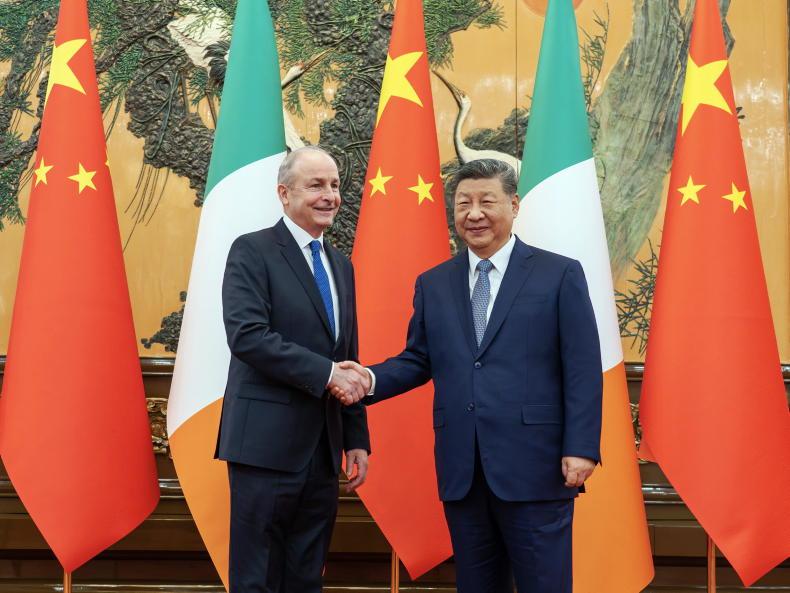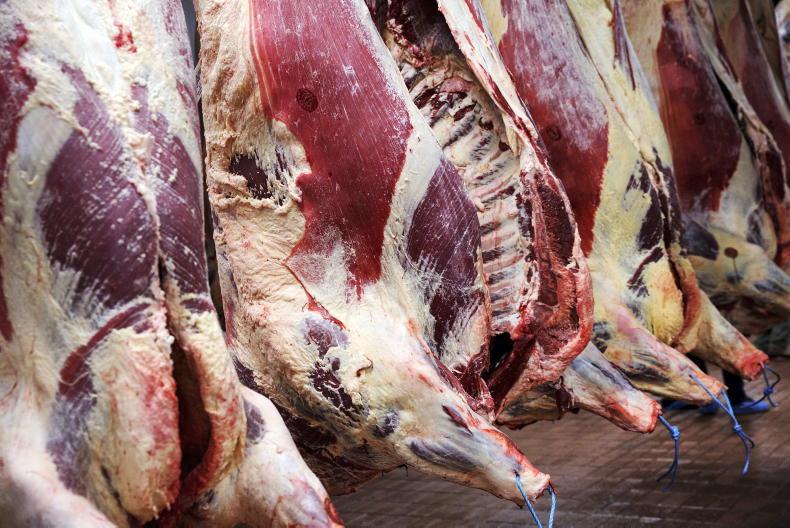Joy at the resumption of beef exports to China was evident at the Bord Bia meat summit on Friday last, particularly with Minister Heydon and Department officials who put in the work to get the result.
Looking at Figure 1, the importance of access to China is clear – it is a 2.5m tonne market for imported beef, twice the size of the next largest market (USA) and will account for a quarter of all beef imported globally in 2024.
For Ireland, it has been a stop-start market. Approval was secured in principle in 2015, but it was 2018 before the first product was cleared to enter the market.
This was when China’s demand for imported beef was in its rapid growth phase and over the following two years, Ireland was making considerable progress in becoming established as a supplier, though we were never in the same leagues as the South Americans, Australia, New Zealand and, more recently, the USA.
Confidence
There was confidence that China could quickly become a 30,000t market for Irish beef exports, putting it inside the top five export destinations. However, there was trouble ahead.
In May 2020, an atypical case of BSE was found and while this is recognised as completely random and has no implications for Ireland’s beef export status with the World Organisation for Animal Health, the protocol with China required beef exports to be suspended.
This suspension lasted until January 2023, when beef exports to China resumed and just when it looked like momentum was building again, another atypical case of BSE was discovered in November 2023, meaning exports were suspended again.
It is good news that this was a relatively short suspension, but there is always a risk of an atypical BSE case and further disruption.
Brazil, which as Figure 2 shows is a much more important supplier to China, has had similar suspension issues because of finding atypical BSE cases on two occasions.
It has been trying to persuade China to amend its protocol on BSE and if successful, Irish farmers and exporters will hope that it is extended to all beef suppliers.
Beef price impact
Now that China is open again, farmers are asking what can it do for Irish beef prices. The answer is that in the short term, probably not very much. The reason is explained in Figure 2.
The growth in Brazil’s export volumes to China increased proportionately to China’s increased demand over the past decade. However, while volumes in 2023 were just below the 2022 record, there has been a striking drop in the value per tonne Brazil’s exporters secured from beef sales to China.
At just $4,790 per tonne in 2023, the price was below what was obtained in 2015 and a huge 24% below the value per tonne secured in the record year of 2022.
The reasons for this are explored in more detail in an interview with Rupert Claxton from GIRA Consulting, but aside from price, there are other reasons why China is currently less attractive to Irish beef exporters than we might expect.
In fact, when the market was open last year, several factories opted not to supply because there were better market alternatives and China didn’t justify the segregation necessary to provide under-30-month cattle.
The other drawback has been the fact that both bone-in cuts and offal are excluded at this stage - both of these categories make up a substantial element of Chinese beef imports.
Comment – is chasing China a waste of time?
If this question had to be answered on the basis of what impact this news will have on the immediate price of beef or where our exporters target, then the answer would be yes.
However, if we take a medium- to long-term view, then having access to China and other Asian markets are essential for the longer-term prospects for Irish beef.
The current market is driven by a scarcity of supply in the UK and that is likely to remain for much of 2024. However, if we consider the FAO analysis on where growth in beef export markets will come from over the next decade, almost all of it will come from Asia.
That is why it is important that China, Japan, South Korea and others are opened and ready for business when the opportunity comes.
Opening a market takes years and it is the job of the Government to ensure as many market options as possible are available for Irish farmers and exporters. China may not justify hype at present, but it is a strategic part of the longer-term export strategy for the Irish beef industry.
Read more
Bord Bia to restart beef and lamb campaign in China
Review of major beef exporters in 2023
China hits peak beef imports
Joy at the resumption of beef exports to China was evident at the Bord Bia meat summit on Friday last, particularly with Minister Heydon and Department officials who put in the work to get the result.
Looking at Figure 1, the importance of access to China is clear – it is a 2.5m tonne market for imported beef, twice the size of the next largest market (USA) and will account for a quarter of all beef imported globally in 2024.
For Ireland, it has been a stop-start market. Approval was secured in principle in 2015, but it was 2018 before the first product was cleared to enter the market.
This was when China’s demand for imported beef was in its rapid growth phase and over the following two years, Ireland was making considerable progress in becoming established as a supplier, though we were never in the same leagues as the South Americans, Australia, New Zealand and, more recently, the USA.
Confidence
There was confidence that China could quickly become a 30,000t market for Irish beef exports, putting it inside the top five export destinations. However, there was trouble ahead.
In May 2020, an atypical case of BSE was found and while this is recognised as completely random and has no implications for Ireland’s beef export status with the World Organisation for Animal Health, the protocol with China required beef exports to be suspended.
This suspension lasted until January 2023, when beef exports to China resumed and just when it looked like momentum was building again, another atypical case of BSE was discovered in November 2023, meaning exports were suspended again.
It is good news that this was a relatively short suspension, but there is always a risk of an atypical BSE case and further disruption.
Brazil, which as Figure 2 shows is a much more important supplier to China, has had similar suspension issues because of finding atypical BSE cases on two occasions.
It has been trying to persuade China to amend its protocol on BSE and if successful, Irish farmers and exporters will hope that it is extended to all beef suppliers.
Beef price impact
Now that China is open again, farmers are asking what can it do for Irish beef prices. The answer is that in the short term, probably not very much. The reason is explained in Figure 2.
The growth in Brazil’s export volumes to China increased proportionately to China’s increased demand over the past decade. However, while volumes in 2023 were just below the 2022 record, there has been a striking drop in the value per tonne Brazil’s exporters secured from beef sales to China.
At just $4,790 per tonne in 2023, the price was below what was obtained in 2015 and a huge 24% below the value per tonne secured in the record year of 2022.
The reasons for this are explored in more detail in an interview with Rupert Claxton from GIRA Consulting, but aside from price, there are other reasons why China is currently less attractive to Irish beef exporters than we might expect.
In fact, when the market was open last year, several factories opted not to supply because there were better market alternatives and China didn’t justify the segregation necessary to provide under-30-month cattle.
The other drawback has been the fact that both bone-in cuts and offal are excluded at this stage - both of these categories make up a substantial element of Chinese beef imports.
Comment – is chasing China a waste of time?
If this question had to be answered on the basis of what impact this news will have on the immediate price of beef or where our exporters target, then the answer would be yes.
However, if we take a medium- to long-term view, then having access to China and other Asian markets are essential for the longer-term prospects for Irish beef.
The current market is driven by a scarcity of supply in the UK and that is likely to remain for much of 2024. However, if we consider the FAO analysis on where growth in beef export markets will come from over the next decade, almost all of it will come from Asia.
That is why it is important that China, Japan, South Korea and others are opened and ready for business when the opportunity comes.
Opening a market takes years and it is the job of the Government to ensure as many market options as possible are available for Irish farmers and exporters. China may not justify hype at present, but it is a strategic part of the longer-term export strategy for the Irish beef industry.
Read more
Bord Bia to restart beef and lamb campaign in China
Review of major beef exporters in 2023
China hits peak beef imports









SHARING OPTIONS